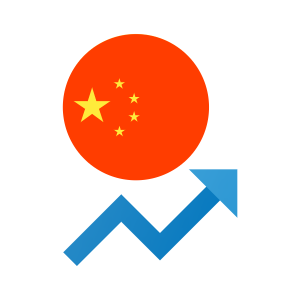Thanks to its population of over 1.4 billion residents, China is definitely a winner when it comes to the competition of the biggest population. This, however, is hardly the only thing that China is known for. China is also known to be one of the most industrious, hard-working, and competitive nations in the world. This, perhaps, is the explanation as to how this country has managed to generate a GDP of over $13.4 trillion back in 2018.
For many years, China has been seen as a manufacturing paradise, with most of the world’s first world nations taking their manufacturing force there, giving the country a huge economic power. This, coupled with the fact that China’s enormous-sized workforce has a high literacy of over 96%, makes China a huge economic powerhouse that can rival the economies like the United States.
In this guide, we will be talking about how this global economic leader manages its Forex environments, what trading opportunities are available for the Chinese traders, and exactly why so many international Forex companies are now leaning towards China. The guide will also make a detailed and extensive review of the country’s regulatory environment, going into detail on what rules, laws, and regulations are in place for the traders’ protection, a well as what the brokers are allowed and required to do.
China’s top Forex brokers
Some of the most important things to consider when choosing your Forex broker in China or anywhere else for that matter, is your safety and security, quality of the service, availability of options, etc. Below is the list that we compiled based on these very same factors, and put together the ultimate list of the very best Forex brokers that China has to offer. If you are looking for a safe, constructive, and productive Forex trading experience in China, then make sure to give each broker below a thorough look, and you will find your ideal Chinese broker in no time!
XM


Min. Depo
$5

Licences
FCA, CySEC, IFSC, ASIC, DFSA

Leverage
1:888

Platforms
MT4, MT5, WebTrader
AvaTrade


Min. Depo
100 USD

Licences
ASIC, FSA, FSCA, FFAJ, FSRA, FSC

Leverage
400:1

Platforms
MT4, MT5
Exness


Min. Depo
$10

Licences
CySEC, FCA, SFSA

Leverage
1:2000

Platforms
MT4, MT5
FundedBull


Min. Depo
49 USD

Licences
N/A

Leverage
N/A

Platforms
MT4, MT5, cTrader
Forex.com


Min. Depo
$100

Licences
NFA, CFTC, FCA, FSA, IIROC and CIMA

Leverage
1:50

Platforms
WebTrader, MT4, MT5
CMTrading


Min. Depo
250 USD`

Licences
FSCA

Leverage
1:200

Platforms
MT4, WebTrader, Copykat
Plus500


Min. Depo
$100

Licences
FCA, ASIC, CySEC, FSCA, FMA, MAS

Leverage
1:30

Platforms
WebTrader, Windows 10 Trader
Forex regulation in China 
There are two regulatory bodies that are in charge of Forex trading in China – the State Administration Of Foreign Exchange (SAFE), and the People’s Bank Of China (PBOC), with the former having larger involvement and broader responsibilities.
In a nutshell, SAFE’s functions are pretty simple – maintain stability on the financial market, control and monitor the activities of the brokers and ensure that they’re conducting their business in a legal and ethical manner, and create favorable conditions for the market to advance and prosper.
SAFE, as mentioned, has a very broad and diverse set of responsibilities. As an example, besides Forex, SAFE is also responsible for regulating cryptocurrencies in China, and also in charge of the country’s external debt and managing the balance of payments.
With such a large spectrum of responsibilities, SAFE obviously needs to have a very effective regulatory framework and approach to the Forex market, if it hopes to do a good job. This is definitely the case with SAFE, as over the years, they have crafted a very effective and strong regulatory environment, in face of its implementations of rules, laws, regulations, and restrictions.
The combination of these things is what’s required of the brokers who are seeking the license from SAFE, which is mandatory for any broker who wants to operate in China. The demands for the license can be numerous and various, all of which have one common aim of creating better market conditions for the traders and for helping take the country’s economy in a positive direction. Let’s discuss some of these practices that brokers have to follow in China.
Difficulties for foreign brokers in China
While in general, the operation of foreign brokers in China is legal, due to China’s closed capital approach, not just any foreign broker can do business in China. Considering that this doesn’t allow the free flow of money in and out of the country unless it’s subjected to very strict and thorough rules, the foreign brokers need to take a different approach.
What these foreign brokers can do is to partner with the locally-based Forex companies, which can serve as “introductory brokers”, and also allow these brokers to connect with locally-based customers too. This is quite a common approach for many Forex markets where it’s hard for foreign brokers to connect to other markets. As an example, the practice of introductory brokers is also common in Qatar as well, where foreign brokers are not allowed to directly offer services but have to use the services of the intermediaries. While this kind of approach limits the number of brokers that can effectively do business in the country, the government sees this as a way to increase safety on the market.
However, simply partnering with an introductory broker is not enough. Foreign brokers have to satisfy certain requirements of the government, and also have to be licensed by some other well-respected foreign regulators such as FCA, FSA, or similar.
As you can see, when it comes to who’s allowed to be a broker in China, the bar for entry is quite high. Not just any broker is allowed to China and only the ones that demonstrate their merit and trustworthiness are given the permit, meaning that the standard of the service is quite high, providing for much better conditions.
Enhanced surveillance
China’s main approach to regulating the market is by upping the ante on surveillance and monitoring of the brokers. China’s goal is to ensure that the amount of money going in and out of the country, especially with foreign currencies, is adequately tracked and monitored.
As such, one of the key requirements of China – or, at least, if not a requirement, a strong preference – is for the brokers to have some kind of a physical presence in the country. The ones that do are favored heavily, and the ones that don’t, are even likely to have their license revoked. This is one of the many reasons as to why China requires the broker to have some kind of introductory arrangement by the local brokers, but the ones that have a physical office are even more preferred.
The monitoring and surveillance do not end with the inflow and outflow of the money, though. China keeps a close eye on almost every operation of the brokers, whether that be deposits and withdrawals, financial reports of the company’s performance, success ratios of the traders themselves, customer service interactions, and much more. This is exactly why China is so adamant about the physical presence in the country, as it allows for much better monitoring and observation. China has suspended over 600 brokers throughout the last years due to this issue.
Obviously, China has a very authoritative and controlling approach to when it comes to regulating the market. In fact, many people believe that China does go a bit overboard, and this kind of a draconian approach is actually counterproductive and discourages the brokers from doing business. While there definitely is a point in that statement, China doesn’t see it that way, and they believe that this kind of an authoritative approach is the exact solution that the market needs and they believe that it is working better for them. Whatever your view on the matter is, it’s doubtless, that these conditions are all aimed at making trading in China a much safer experience for you, the trader.
Restrictions on traders
In China, there are numerous restrictions on not only the brokers but traders as well. This is mainly concerning retail traders, who are regular everyday people. While all retail traders are legally permitted to trade, this comes with certain restrictions2. As an example, regarding how much they can trade annually. This depends on the experience of the trader themselves. If the trader is deemed to not have enough experience, knowledge, and expertise to trade beyond a certain amount, then they will be restricted from doing so. This is controlled by the Chinese government, but the brokers themselves are also required to control the clients and prohibit them from trading beyond a certain amount when necessary.
Additionally, margin trading is not legal in China. In the past, it was allowed, as long as the brokers met certain requirements, and had the necessary permissions and qualifications confirmed by the government. However, back in 2008, the government passed a law making it illegal, and now, those who violate this law will be subjected to penalization, which can be in form of a simple warning, a fine, or even suspension of the license; all depending on the severity of the situation.
The economic landscape and trading opportunities on the Chinese Forex market
The socialist economy of China is really something different. When measured solely based on nominal GDP, it’s the second biggest one in the world, surpassed only by the US. What’s impressive is the pace at which it continues to grow. Only until 2015, China’s economy was the fastest-growing one in the world, with an average growth rate of 10% over the span of 30 years. China’s economy is fairly balanced, with the private and public sectors both being strong and respectable contributors to its growth. This strength in balance is one of the main reasons for China’s growth as an economic and political player in the world.
In terms of the specifics, China’s economy is largely based on manufacturing, at which it’s the global leader of the world. China’s skilled workforce is really the cornerstone of the economy, as it definitely won’t have been to achieve the growth progress it did without them. However, the impressive part is that despite being the main producer and manufacturer in the world, it also has a big consumer market as well. In fact, China is the second-largest importer in the world, which puts into perspective how versatile its economy is.
With all this being considered, it’s easy to see why China is regarded to have such a major, huge role in the global economy. China has been a valuable member of the World Trade Organisation ever since 2001 and has made major efforts for forging strong trading ties with the rest of the world. Currently, it has a free trading agreement with numerous countries such as Switzerland, New Zealand, Australia, South Korea, Pakistan, and more.
As one of the major manufacturers in the world, naturally, China is quite an industrialized nation, but this is definitely not the case for the whole of China. This strong industrialization is mainly confined to the coastal regions, but for the more “inner” China, agriculture is very strong. In fact, it’s a very major part of the whole Chinese economy, with over 300 million people being actively employed in it. We can see the reason for this with China being one of the major producers and exporters of rice, corn, tobacco, potatoes, wheat, and more. All this information is a huge factor to consider for anyone interested in currency or commodity trading in China. Let’s delve a bit deeper into what kind of opportunities China offers in these endeavors.
 Currency trading in China, and the Chinese Yuan
Currency trading in China, and the Chinese Yuan
The Chinese national currency definitely has an interesting story. Before the communist party took over, the country had several different currencies that were used all across the country. However, the party soon started to issue its own currency, which would eventually become what it’s known as today – the Chinese Yuan. However, what many people don’t know is that Yuan has not one, but two names, as besides the Chinese Yuan, it’s also known as the Chinese Renminbi.
From the beginning, Yuan was pegged to the USD, and its value was largely dependent on it. However, as China’s ambitions to establish itself as an economic power kept increasing, so had their desire to establish the Yuan as an independent currency. It ceased to be pegged to the USD in 2005, and all seemed to be going according to the plan, but it had to be re-pegged to it due to the 2008 financial crisis. As of today, the Chinese government’s approach with the Yuan is to eventually take it far enough to make it a regionally-dominant currency in South-East Asia, and for it to compete with the currencies like the Japanese Yen and the Euro, as well as become one of the major Forex reserve currencies in the world.
While these goals sound like they should provide ample opportunity for anyone interested in currency trading in China, it should definitely be noted, that thanks to China’s closed capital policy, which we described above at length, there definitely are some difficulties. As we have already spoken, China keeps a very watchful and controlling eye over any currency that goes in and outside of the country. Due to this, some may find the currency trading landscape in the country a bit unencouraging, to say the least.
With that being said, due to being one of the biggest financial hubs not only in the region but in the whole world, and due to being in close proximity with major Forex currencies like the Japanese Yen, it should definitely not be counted out. Moreover, with China’s obsession with always growing economically and increasing its political influence, you can always expect steady growth for the potential of your investment endeavors.
Trading commodities in China
Commodity trading is rather interesting in China, mainly due to the reason that it’s so economically diverse. In China, there is a business for literally everything, opening up a vast amount of opportunities for so many different avenues to explore. Whether it is investing in stocks of the actual companies, or trading on the commodities like natural resources, China has it all and can accommodate almost any taste. Let’s take a quick look at the actual numbers on how broadly the Chinese economic branches grow and expand.
Based on 2019 data, China has exported a total of over $2.49 trillion’s worth of goods all around the world. Thanks to its involvement in so many different industries, the ratios of this export number are quite diverse, opening up loads of opportunities.
From this huge exportation number, the biggest one is electrical machinery and equipment, standing at $671 billion dollars a year, which would be about 26.9% of its total exports. China is very strong in this sector, thanks to its huge efforts in manufacturing, a well as a general affinity for tech. This industry is so successful because China manages to satisfy the demand for a huge number of companies and individuals that have a need for these products.
They can be used for a multitude of different purposes, such as large and big projects like building electric power stations, as well as smaller ones like wires and cables, electromotors, etc. Thanks to the large, powerful Chinese companies of this field like Grand Tech Group Ltd, Wuxi Media Electro-Technical Co. Ltd, Foshan Risen Electronics Co. Ltd., to name a few, this industry is absolutely booming, and will likely continue to do so in the future.
China’s second-largest export sector would be machinery, which would also include computers. The export numbers for this field are $417 billion, which is 16.7% of the total. This should be at no surprise, as China is almost obsessed by everything computer-related, and they invest in them heavily, as they see them as one of the key pieces in helping them advance their economy, increase the quality of life for their citizens, and establish China as one of the fastest-growing and leading countries in the world. Thanks to the great computer companies such as Lenovo being based in China, the country’s computer industry is in a really strong position right now.
The third-largest export sector for China would be furniture, lighting, bedding, signs, and prefab buildings, all classified into one single sector. Thanks to China’s huge abilities of manufacturing, it’s natural that it would be one of the major exporters and producers in this field. The total export number here goes up to as much as $99.5 billion dollars, which would represent 4% of the total.
Plastic is also one of the things where China really shines, being among the leading exporter in the world. The total for this field goes up to as much as $84.4 billion, which is 3.4% of the total.
Despite not known for being a major car manufacturer like, as an example, Japan or Germany, China is a major exporter of vehicles as well, with the total number of $74.4 billion dollars per year. The impressive part is that although the numbers are so big, it only accounts for 3% of China’s economy.
Expanding on to the previous point, to put into perspective of just how large the Chinese economy is, it exports optical, technical, medical apparatus of $73 billion, Knit or crochet clothing, accessories of $71.4 billion, Articles of iron or steel of $69.6 billion, clothing, accessories (non-knit and crochet) of 66.8 billion, and Toys and games of $62.8 billion, with these fields accounting for 2.9%, 2.9%, 2.8%, 2.7%, and 2.5% respectively. The proportions themselves are really low when taken in the grand scheme of things. However, the actual numbers looked at in the dollar amounts, are absolutely staggering, which really highlights the sheer size of China’s economy.
The point here is, there really are limitless opportunities for anyone interested in investing in China and Chinese companies. No matter if you’re a beginning Forex trader or an experienced veteran, there is nothing that you will feel like you’re missing when doing Forex in China. The added benefit is that you will never have to “put all your eggs in one basket”, which is something that will serve and pay you huge benefits in the future.
Pros and cons of China based Forex brokers
These are what we believe to be the pros and cons of Forex trading in China
Pros
- A very broad and diverse economy
- Safety is taken to the next level thanks to the government’s extensive involvement
- China is always growing economically
Cons
- Brokers have a hard time operating in China due to increased control from the government
- Traders have to deal with certain restrictions based on their experience
Forex trading in China – key takeaways
If you’ve read this guide fully, you are likely very excited now with the huge amount of opportunities that the Chinese Forex market offers. Thanks to China’s ever-growing desire for moving forward economically and politically, the nation is one of the definite economic leaders in the world, which, of course, allows for a thriving Forex market that we have described just now.
If you are interested in Forex trading and are based in China, then what we can say is that there definitely are tons of opportunities for Chinese Forex traders and that there are infinite possibilities with which it can all prove to be a fruitful endeavor for you. However, as is the case with almost everything else, you definitely have to make sure that you’re making enough of the much-needed research when it comes to getting involved with Forex trading, which, when it comes to trading in China, is even more important.








